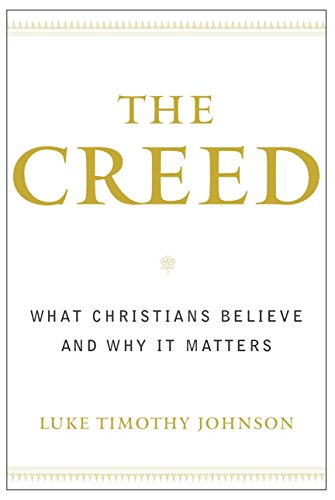This week we are studying the Holy Spirit in the third article of the Creed. Please read Chapter 7 “We Believe . . . in the Holy Spirit” of Luke Timothy Johnson’s book: The Creed: What Christians Believe and Why It Matters.
One of the more (at least for me) fascinating controversies within the Creed concerns the nature of the procession of the Holy Spirit. The Creed as formulated at Nicaea (325) and Constantinople (391) professed that “We believe in the Holy Spirit . . . who proceeds from the Father.” Over time, the Western Church added the phrase “and the Son” to this profession. (In Latin, the phrase is one word “filioque.”) In Against Praxes, the Latin theologian Tertullian (155-240) coined the word “Trinity” and wrote that the Spirit proceeds from the Father through the Son (“per filium”). This understanding became shortened to “and the son” at a regional synod in Toledo, Spain in 589 to combat Arianism, and it slowly crept into various Latin liturgies despite objections by the Pope. Its use became regularized in the Western Church sometime in the eleventh century. The use of the filioque was one of the reasons for the Great Schism in 1054 and remains one of the primary sticking points between reconciliation between Rome (or Canterbury) and Constantinople. I have attached a good theological and political history of the filioque from J.N.D. Kelly’s book Early Christian Creeds. pp.358-67.
Although the dispute of the filioque (as well as any church dispute) can devolve into politics unrelated to the subject matter, working through the controversy is important. A dispute over the phrase challenges us to think more deeply about the very nature of the Trinity. As Kelly points out, in the East, the Father’s relationship to the other two persons of the Trinity is as the Cause of the others. The Son is begotten of the Father, and the Spirit proceeds from the Father. For them, saying the Spirit also proceeds from the Son causes a confusion within the nature of the Godhead. The Son is not the Creator and therefore cannot be the Cause of the Spirit.
On the hand, Augustine, in the West, envisioned the persons of the Trinity has having no cause per se. Rather since God is Love, God necessarily contains three parts: a Lover, a Beloved, and a Love which binds them together. On the Trinity (9.2). Therefore, the Spirit necessarily arises from both the Father and the Son since both the Subject and the Object of the Love are required to bring about the Love itself. (A more modern way of looking at this analogy is that the Spirit is the electrical spark between the cathode and the anode.) If you have time this weekend, think through the filioque. Contemplate the divine nature of the Holy Spirit and the role the Spirit plays within the Godhead and the relationship between the Father and the Son.
This controversy is still around today. If you want to upset an Eastern Orthodox priest, simply mention the filioque and he will (politely) explain how the Western Church misunderstands the very nature of God. In 1972, an official dialogue opened between the Anglican and Orthodox churches. In their first Agreed Statement (1976), the Anglicans agreed that the filioque should not be part of the Creed. In 1994, General Convention resolved to remove the filioque from any future BCP revisions. Here is the resolution and the explanation. And more recently, the ACNA’s new prayerbook fudges the question and puts the filioque in brackets with a footnote making its recitation optional. 2019 ACNA BCP 109
Dinner is at 6. The menu is black beans and smoked sausage. Discussion about 6:45. Hope to see you here. (And if you don’t really care about the Filioque, please come anyway.)
“When the Advocate comes, whom I will send to you from the Father, the Spirit of truth who comes from the Father, he will testify on my behalf. You also are to testify because you have been with me from the beginning.”
John 15:26-27

